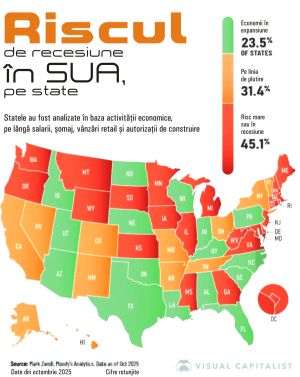The ruling issued by the Court of Justice of the European Union (CJUE) in the Andriciuc versus Banca Românească case represents a great advantage for Spanish debtors, said Patricia Suarez Ramírez, the president of the Association of Financial Consumers in Spain (ASUFIN), as part of a response recently sent to BURSA.
Her statement comes as the Supreme Court of Spain has recently invalidated the currency risk clause in a loan agreement denominated in Japanese yen, due to the lack of information, invoking the Andriciuc clause. We remind that the Andriciuc case concerned the freezing of the CHF exchange rate in a loan agreement denominated in Swiss francs (CHF).
Patricia Suarez Ramírez told us: "We are very pleased by the ruling of the Supreme Court (ed. note: in Spain, in the case brought by a customer against Barclays), because we are talking about an ASUFIN member (ed. note: involved in this case) and we have been fighting for a few years to defend those affected by loans denominated in foreign currencies.
The news concerning the ruling of the Court of Justice of the European Union for the Romanian case (ed. note: the Andriciuc versus Banca Românească case) has been a great advantage for us".
ASUFIN recently wrote that the ruling of the Supreme Court in Spain will come to the aid of the almost 70,000 people who during the real estate bubble took out loans denominated in Japanese yen and Swiss francs.
The Spanish court thinks, among other things, that even though the average consumer can foresee the risk of a hike of the exchange rate without requiring special information, the same doesn't apply to other risks associated to the mortgage in question. According to the Spanish court system, in this particular case, the exchange rate fluctuation represents a constant recalculation of the borrowed capital, and if the debtor periodically made their payments, would owe even as much as 50% more capital in Euros than at the time the initial loan had been delivered initially. Thus, things can end up where the bank can call the loan early, if the Euro currency devalues significantly compared to the foreign currency, meaning that the consumer would be unable to make its payments, according to the justification of the Spanish courts.
In this context, the clauses that were the object of the lawsuit do not pass the transparency test, the Supreme Court of Spain thinks, which declares the partial nullity of the loan agreement and the elimination of the mentions to the denomination of the currency in which the loan was taken out, which remain granted and amortized in Euros. The Court understands that declaring the loan totally null would represent a serious prejudice to the consumer, who would be required to refund the entire amount owed in one tranche.
"The lack of transparency of the currency risk clauses has generated a serious imbalance for the debtors, which goes against the request for good faith, because, by ignoring the serious risks involved in taking out the loan, they were unable to compare the multi-currency mortgage offer with other loans and their economic and judicial situation has worsened", the Supreme Court of Spain said.
In the end of the argumentation, it states that the ruling will be notified to the parties and inserted in the "legislative collection", which is similar to the Official Gazette in Romania, according to the specialists.
Concerning this aspect, the president of the ASUFIN told us: "All the rulings of the Supreme Court are recorded in the legislative register, which doesn't mean that the decision will have a rank of law, but it will be a part of Spanish case law and the courts below the Supreme Court will be required to apply the principle that this ruling is based on".
Lawyer Gheorghe Piperea, the defender of the borrower in the Andriciuc versus Banca Românească case, told us that the cancellation of the exchange rate risk essentially means the return to the terms valid in the beginning of the contract - as the borrower no longer bears the currency exchange risk -, meaning the freezing of the amount owed at the amount in Euros set on the date the loan was granted.
"A lawsuit to refund the payments that were not owed made during all these years may even follow", Gheorghe Piperea further told us.
The argumentation of the Spanish court invokes, over ten times, the criteria in the ruling of the Court of Justice of the European Union rendered on September 20 2017 in the Andriciuc case. In the Oradea case, the CJEU says that in loan agreements, banks are required to present the potential variations of the exchange rate and the risks that are inherent to taking out a loan in a foreign currency. The information provided by the banking institutions needs include not just the possibility of the strengthening or weakening of the currency in which the loan has been contracted, but also the impact of the exchange rate fluctuations and a hike of the interest rate would have on the loan, according to the Court of Justice of the European Union. Also very harsh are the statements of the CJEU concerning the fact that the imbalances in a loan agreement denominated in foreign currencies, even though they may be verified at the time of the conclusion of the agreement, they may still show up later.
The national court will decide the abusive nature of the currency risk clause and whether that risk has been expressed clearly and intelligibly in the loan agreements, the CJEU decided. This is equally binding to the other national courts that see lawsuits brought on similar issues. So far, most of the lawsuits requesting the freezing of the CHF exchange rate that are on the docket are suspended in wait for the ruling of the CJEU in the Andriciuc case.
This case was tried on November 14th, and the ruling was postponed until November 28th.
According to lawyer Gheorghe Piperea, Romanian judges could be excluded from magistracy, for failing to apply the rulings of the CJEU. "In Romania, most of the banks that issued loans denominated in CHF are small and have a precarious situation. In this case in Spain, even though Barclays is a giant bank, Spanish judges did not get intimidated by its size and of the market for its loans, elements which have, however, overwhelm the Romanian case law, in over seven years that we've been fighting in court.
When I won the lawsuit against Volksbank, there was just one step left until its death. It was in its death throes and all you had to do was give it a shove to rush its demise. But with BCR, in a completely similar lawsuit, with a similar action, the same lawyers, identical contracts and practices, the courts turned everything upside down.
This shows that to the Spaniards, it is not the size of the giant that matters, but their fairness".
According to Mr. Piperea, for the Bucharest Court of Appeal, both before and after the ruling of the Court of Justice of the European Union in the Andriciuc case, what mattered was either the size of the bank, or the presence of the judges at the NBR seminars in Sinaia, or the people present there imposed their own incorrect common law.























































